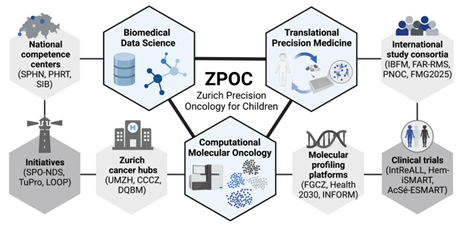Geförderte Plattformen
Zurich Precision Oncology for Children (ZPOC)

«Zurich Precision Oncology for Children» is the first UMZH Technology Initiative awarded in 2023. Under the leadership of Prof. Dr. Dr. Jean-Pierre Bourquin and Prof. Dr. Ana Guerreiro Stücklin from the University Children's Hospital Zurich and the University of Zurich, a platform is being developed in collaboration with ETH Zurich, Balgrist University Hospital, and the University Hospital Zurich to pool health data for more precise therapies for children with difficult-to-threat cancers.
For children with relapsed/refractory cancers and high-risk disease, currently no standardized framework exists in Switzerland to offer state of the art molecular profiling and identification of therapeutic targets. The combination of advanced molecular profiling and ex-vivo drug response profiling emerges as a powerful approach to guide personalized treatment decisions and has become a prerequisite for entering molecularly guided clinical trials for children. For adult oncology patients, critical infrastructure for data (Swiss Personalized Health Network - SPHN), and tumor profiling (Tumor Profiler Center, Swiss Personalized Oncology National Data Stream SPO-NDS) is being implemented. Urgent gaps must now be filled to enable an innovative precision oncology program also for children.
ZPOC bundles resources to establish a platform at the UMZH-campus Lengg and will connect the Cancer Centre of the University Children's Hospital Zurich in concert with strong partners at UMZH with national initiatives (such as SPHN) and other leading centers of excellence across Europe. The heart of this pediatric oncology technology initiative is an expert team aiming to standardize and integrate clinical, molecular, and functional profiling data to guide complex treatment decisions for pediatric oncology patients.
PRECIOUS: A Design & Trial Service for Precision Digital Therapeutics
Significant investments are required to achieve high-value care by improving the individual experience of care, the health of populations, and reducing the per capita costs of care.
Precision digital therapeutics (PDTx) are software-based, highly personalized interventions for managing and treating disease. PRECIOUS, a cloud-based design and trial service for PDTx will support UMZH members with the design, implementation and scaling up of regulatory-compliant PDTx to make UMZH treatments more efficient. PRECIOUS will, thus, accelerate the translation from PDTx research to clinical practice.
Further details are available here.
Zurich Trace: A Clinical Platform for Stable Isotope Tracing
Understanding metabolic activity is essential for uncovering disease mechanisms and developing targeted treatments. However, the measurement of metabolic fluxes—the dynamic flow of metabolites through biochemical pathways—has been difficult to implement in clinical practice due to high costs, complex data interpretation, and a lack of standardized protocols. Zurich Trace is working to change this by establishing a structured, clinically validated platform for metabolic flux analysis, enabling clinician-scientists and researchers to apply this advanced technology in a defined and accessible setting.
This initiative is a collaboration between the University Hospital Zurich (USZ), the University of Zurich (UZH), ETH Zurich (ETHZ), and the University Children's Hospital Zurich bringing together leading experts in clinical medicine, biomedical research, and advanced metabolic analysis.
By integrating metabolic flux measurements into a standardized clinical framework, Zurich Trace aims to provide a reliable and accessible resource for studying metabolic activity in health and disease. This approach not only supports basic and translational research but also holds potential for future applications in diagnostics and precision medicine.
Through a structured and standardized platform for metabolic flux analysis, Zurich Trace ensures that clinician-scientists and researchers have access to a validated framework for investigating metabolic processes in a robust and reproducible manner. By facilitating collaboration across institutions and disciplines, this platform will contribute to the advancement of metabolic diagnostics and help refine tools for disease monitoring and therapeutic decision-making. Ultimately, Zurich Trace aims to bridge the gap between research and clinical application, making metabolic flux analysis an integral part of the biomedical landscape.
Further details are available here